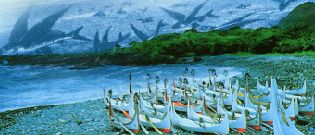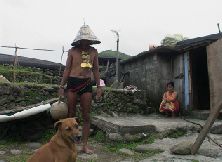Heavenly Peace in Small Town
A warm small town named Tung-Shih where live a crowed of brave people goes very hardly through the disaster of big earthquake on 21st September in 1999.It’s possible to chose or not to remember or forget all about the deep sorrows, disaster details and tears. Hi violin-playing boy! Do you know your music has spread all the ruins of small town and into everyone’s heart. Then the houses are rebuilt, the iron shop is replacing it’s commercial plate and the mountain fruit fields are arranged.
It is no worries because the turnip cakes are made for the festival and will be putting into the steaming basket. It is easy because the veteran is chatting joyfully about his bride in Mainland China and reciting the letter from her. It’s sweet because the one-hundred-year-old grandma is holding your hands tight to wish you well and happy. Now you realize you will get more once when you have lost. Let’s cross fingers and pray to God for heavenly peace from generation to generation.


